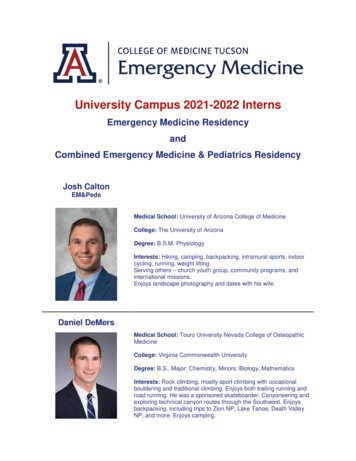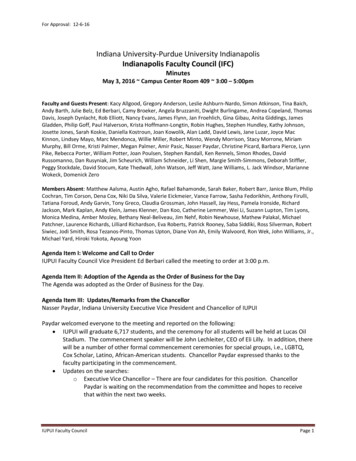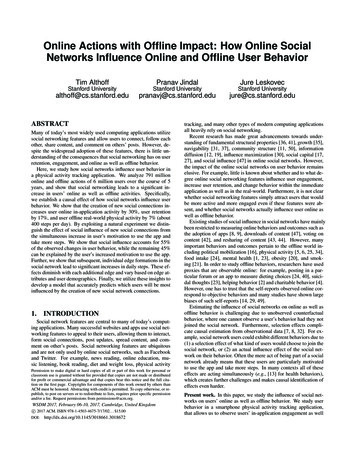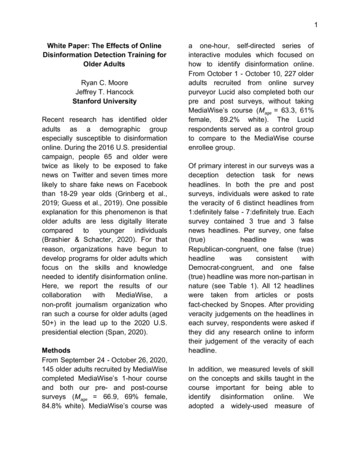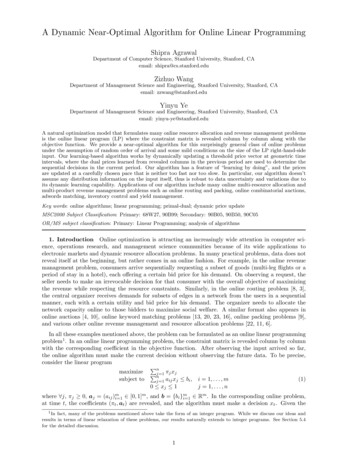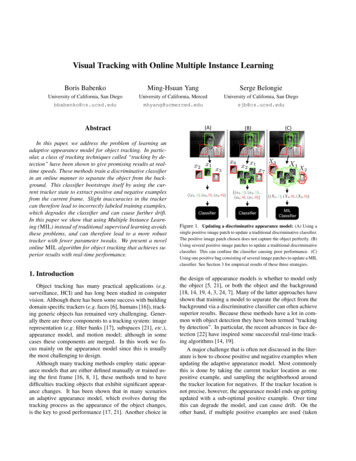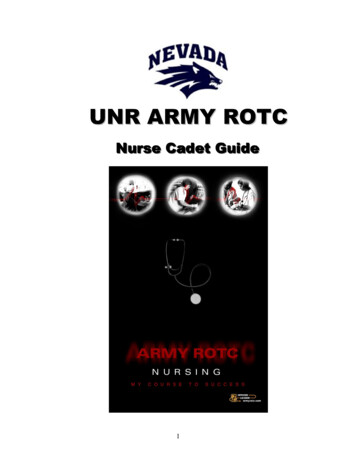
Transcription
UNR ARMY ROTCNurse Cadet Guide1
BLDG 1010 LIGGETT AVEFORT LEWIS, WA 98433-9500PHONE/ FAXWESTERN REGION NURSE COUNSELOR (253) 967-9619 / 98158th BRIGADE NURSE COUNSELORLouisiana, Alabama, Mississippi,Florida Pan Handle(256) 955-0859 / 75799th BRIGADE NURSE COUNSELORWisconsin, Michigan, Indiana, NorthernIllinois(847) 266-3097 / 309510th BRIGADE NURSE COUNSELOROklahoma, Arkansas, Missouri, SouthernIllinois(573) 569-1986 / 027711th BRIGADE NURSE COUNSELOR(719) 526-9264 / 0633North Dakota, South Dakota, Minnesota,Wyoming, Nebraska, Iowa, Colorado, Kansas12th BRIGADE NURSE COUNSELORNew Mexico, Southern Oklahoma, Texas(210) 295-2007 / 201813th BRIGADE NURSE COUNSELORAlaska, Hawaii, Guam, Washington, OregonIdaho, Montana(253) 967-5383 / 852714th BRIGADE NURSE COUNSELORCalifornia, Nevada, Utah, Arizona(831) 242-7697 / 7696ARMY ROTCThe Smartest College Course You Can Take2
Table of ContentsThe US Army Nurse Corps . . . . .4Army ROTC – The Edge . . . . 6Army ROTC Program Basics . .7Nurse Summer Training Program . .8Financial Benefits for School . .9Officer Salary Comparison 10After Graduation. . .12ARMY ROTCThe Smartest College Course You Can Take3
THE U.S. ARMYNURSE CORPSREADY, CARING, PROUDThe Army Nurse Corps is the branch of the Army composed ofprofessional, college prepared nurses. A Bachelor of Science in Nursing isthe minimal entry level. As nurses progress in experience, seniority andrank, most will go back to school and obtain their Masters Degree. About10% of Senior Nurse Corps officers have their PhD. The Army providesfinancial support and duty time to obtain advanced degrees.The Nurse Corps is part of the AMEDD – the Army Medical Department.The other corps that are part of the AMEDD are the Medical Corps(Doctors), Dental Corps, Veterinarian Corps, Medical Service Corps(laboratory officers, logistics, computer specialists, hospital administration,etc) and Medical Specialist Corps (Physician Assistants, Nutritionists,Physical Therapists, Occupational Therapists, Opticians, Audiologists, etc).There are approximately 3,400 nurses in the Army Nurse Corps on ActiveDuty. Pay, management policies, and benefits are the same across the USand overseas. Assignment options include working in a medical center,community hospital, or clinic, as well as in field nursing or nurse recruiting.Other possible positions include working in the assignment process at theNational level, specialty work as a White House nurse or congressionalfellow, in addition to working with the Federal Emergency ManagementAgency (FEMA) or the Joint Commission of Accreditation of HealthcareOrganizations (JCAHO).If you participate in Army ROTC as a nursing student, you would requestbranching into the Army Nurse Corps. For the past 5 years, 100% of allROTC cadets who successfully graduated from thenursing program and passed their NCLEX were brought into the Army asNurse Corps officers.ARMY ROTCThe Smartest College Course You Can Take4
Once on active duty, you will attend the Officer Basic Course, where youwill learn more about the Army Medical Department, field nursing, and thedocumentation system used in the Army hospitals. The Army MedicalDepartment is on the forefront of computerized charting – creating anationwide standard so you don’t have to learn a new system every timeyou change locations.As Nurse Corps Officers, our primary mission is to provide health care toservice members and their families, at home and abroad, in times of peaceand war. As such, even though many Nurse Corps officers specialize, ourcore business is Adult Medical/Surgical Nursing. During your first nursingassignment after school, you will be assigned to an in-patient hospital andwill most likely spend your first year in the adult medical/surgical section tosolidify your nursing skills. After that, you may select from one of fourspecialty courses – ICU nursing, Preoperative nursing, Psychiatric nursing,and OB-GYN nursing. If you are fulfilling all of your military requirements(i.e. maintaining height and weight standards, as well as passing the ArmyPhysical Fitness Test), the Nurse Corps guarantees that you will beallowed to attend one of these courses during your 2nd year of service. Youmay also compete for a slot in the Emergency Nursing or CommunityHealth Nursing courses.After your initial 4-yr obligation, you may either leave Active Duty or chooseto stay. If you stay, you may apply for graduate level education and, ifselected to this competitive process, the Army will provide tuition money forup to 21 months (within dollar limits) while your duty assignment will be toattend graduate school. Options include Clinical Nurse Specialist, NurseAnesthetist, Family Nurse Practitioner, Nurse Midwife, NursingAdministration, Nursing Education, and Informatics. Approximately 100officers are selected for this option each year.ARMY ROTCThe Smartest College Course You Can Take5
Army Nursing – The ROTC EdgeLeadership With CompassionIf nursing is your professional goal, there is no better place to begin yourcareer than the Army Reserve Officer Training Corps (ROTC). ArmyROTC offers you a unique opportunity to gain practical experience whileyou receive financial assistance for college. Nursing majors compete for 2,3, or 4-year scholarships.ROTC enhances your undergraduate nursing education or graduatenursing education by providing the unique leadership and managementtraining, along with the practical experience needed for success, either inthe Army or in a civilian career. You will develop your professional skillswhile you learn some meaningful things about yourself and what you canaccomplish. You will also develop leadership skills, self-confidence,flexibility, and adaptability while having fun.As an ROTC nurse cadet, you will be able to combine college electives inmilitary science and invaluable nurse summer training experience with yournursing program.After obtaining your baccalaureate degree and meeting the prerequisites,you will receive a commission as an Army Nurse Corps (ANC) officer.Once you have identified your assignment choices, you will be ready totake on the challenges of your profession in one of the Army hospitals inthe U.S., Germany, or Korea.As an officer, you'll have the opportunity to lead, advance professionally,obtain specialized training, work with the latest medical technology, andserve with other highly trained medical personnel as an important memberof the health care team.Army ROTC is where is starts for the future leaders of the Army NurseCorps. Take advantage of the ROTC edge.ARMY ROTCThe Smartest College Course You Can Take6
Army ROTCProgram BasicsThe Reserve Officer Training Corps (ROTC) provides an opportunity forcollege nursing students to receive practical, hands-on leadershipexperience. The ROTC courses provide a chance for students to developmanagement, communication and decision-making skills in a nonthreatening environment. Physical training and confidence-buildingactivities (i.e. rappelling, obstacle courses) also provide a chance forstudents to be physically and mentally challenged.The ROTC program is taken in conjunction with your regular classes in aselected major field, plus other general education requirements you need tocomplete to earn a commission. The main focus is on management andleadership skills development, with increasing responsibilities as youprogress through the program. A typical cadet takes 2-4 credits of ROTCclass per semester, which may count towards your total credits required tograduate. The ROTC program itself can be taken on a 4, 3, or 2-yearbasis. The first 2 years are the Basic Course and the last 2 years are theAdvanced Course. Your academic and military status as a cadet willdetermine the length of time you need to complete your ROTCrequirements.ARMY ROTCThe Smartest College Course You Can Take7
Nurse SummerTraining Program(NSTP)The NSTP is a paid three-to-four week clinical elective for Army ROTCnurse cadets. Attendance is voluntary. Our affiliated nursing schoolawards academic credit for this program.This elective is conducted at Army hospitals in the United States, Germanyand Korea. You get paid while attending NSTP during the same summeras Advanced Camp, which is usually between the Junior and Senior year ofcollege.During the NSTP clinical elective, you will receive "hands on" experienceunder the direct supervision of a preceptor -- an Army Nurse Corps officerwho works with you one-on-one. Regular coaching sessions enhancesyour progress, while also providing feedback about your performance.While you follow the same duty schedule as your preceptor, you mayreceive training in several areas, including patient assessment, planning ofpatient care, nutrition maintenance and feeding techniques, range ofmotion and mobility, medication administration, emergency procedures,intravenous (IV) therapy, and other special procedures and techniques.ARMY ROTCThe Smartest College Course You Can Take8
FinancialBenefitsFor SchoolScholarship2, 3, and 4-year scholarships are available to nursing students All scholarships provide:Tuition/fees: up to 17,000 per yearBooks: 600 per yearMonthly tax-free stipend during the school year. ( 250/month as afreshman, 300/month as a sophomore, 350/month as a junior, 400/month as a senior)University incentives: some schools offer additional incentives forscholarship winners (i.e. free room and board, out of state tuitionwaivers, etc.)Criteria for Scholarships:United States CitizenshipHigh School Graduate with a minimum GPA of 3.0Minimum SAT of 1050 or ACT of 21Physically fit and medically qualifiedUnder 31 years of age on 30 June of the year you graduate from collegeGood moral characterNon-ScholarshipStudents can participate in ROTC without a scholarship and will receive amonthly stipend starting their junior year, currently 350 per month (up to 3,500 per year) for their junior and 400 their senior year.ARMY ROTCThe Smartest College Course You Can Take9
OfficerSalaryComparisonAs a commissioned officer in the Army Nurse Corps your benefits include:Competitive salary with regular promotions, 30 days paid vacation eachyear (in addition to time off for 11 Federal Holidays) starting in the first year.Medical and dental care is provided free to active duty service memberswith unlimited sick leave. Also, when changing jobs you do not start on thebottom again but rather retain your same rank and pay.Income ComparisonStarting Income, SingleCivilian2ND LieutenantTaxable salaryFederal Income TaxSocial security (7.65%)Basic Allowance for Subsistence (grocery)Basic Allowance for Housing (rent/mortgage)After Tax Income (less state taxes) 30,000- 4,310- 2,295 0 0 23,395 26,204- 3,910- 2,004 2,006 10,104 (Nat. Avg) 32,400Note 1: 2003 Federal Income Tax Rate Schedules Used.Note 2: Basic Allowance for Subsistence and Basic Allowance for Housing (BAH) are tax-free.Note 3: BAH is determined by the zip code of the Military Instillation where you are assigned.Variations in BAH are based on geographic duty location, pay grade, and dependencystatus. To view additional BAH rates go to www.dtic.mil/perdiem/bahform.html, have Zip Codeavailable and choose O-1 from the pull down menu. More information also athttp://www.dod.mil/cgi-bin/rmc.plAnnual Pay(Continental US Average before taxes; allowances are tax-free)Initially (2nd Lieutenant with less than two years active duty): 38,3152 years later (1st Lieutenant with two years active duty): 47,8433 years later (1st Lieutenant with three years active duty): 53,0594 years later (Captain with four years active duty): 61,520ARMY ROTCThe Smartest College Course You Can Take10
Additional Benefits Package 30 Days paid vacation each year (starting the first year) with time off for11 Federal Holidays Free Medical and Dental Care for Active Duty service members Regular pay-raises every year for the first four years, then every twoyears afterward. In addition, Congress frequently appropriates a payraise for the military every January. Regular promotions; each with a pay raise. Unlimited sick leave Free relocation services Generous retirement plan after 20 years Low cost life insurance (up to 250,000 for 20 per month) Post Exchange and commissary privileges Free use of recreational facilities Unlimited travel opportunities No loss of rank or pay when changing job positions/locationsARMY ROTCThe Smartest College Course You Can Take11
AfterGraduation?After graduation, you will be commissioned as a 2nd Lieutenant in theUnited States Army. Your first assignment, which is determined byevaluating your college performance, ROTC standing, and yourpreferences, can be one of over 25 hospitals in the continental UnitedStates, Alaska, Hawaii, Germany or Korea.Before you go to your first assignment, you will attend the Officer BasicCourse at Fort Sam Houston, Texas, where you will study basic armyknowledge and the functioning of an army unit.Once you have been working as an Army nurse (on active duty for oneyear), you are eligible to attend a clinical specialty course of your choice.Currently, the course choices are:Critical Care NursingEmergency NursingPreoperative NursingObstetrical and Gynecological NursingPsychiatric & Mental Health NursingCommunity Health NursingService ObligationScholarship Recipients: Your total service obligation will be eight years (ofwhich the first four years are Active Duty). At the completion of the first fouryears, you may elect to continue on Active Duty or enter the ArmyReserves for the remaining four years.Non-scholarship Recipients: Your total service obligation will also be eightyears, but the Active Duty commitment is only three years. At theARMY ROTCThe Smartest College Course You Can Take12
completion of the first three years, you may elect to continue on Active Dutyor enter the Army Reserves for the remaining five years.Specialized Nursing OpportunitiesEarning your BSN is an achievement for which you can be proud. Sincenursing is a dynamic profession, your skills and professional knowledgemust be constantly updated. The Army Nurse Corps is committed toproviding opportunities that will enhance your abilities, interests andknowledge. As an Army Nurse, you may apply for specialty courses suchas:Critical Care Nursing: This 16-week course prepares nurses to take care ofcritically ill patients in a variety of critical care settings. Course contentincludes the necessary knowledge and clinical skills, teaching techniques,and the principles of management of the critical care setting.Emergency Nursing Course: This 16-week course prepares nurses tofunction as entry-level emergency nurses. The course will focus onresponsibilities, nursing care, teaching role, principles and techniques ofstaff supervision and management of patients across the life span in anemergency setting. Portions of this course are jointly instructed with theCritical Care Nursing Course.Preoperative Nursing: This 16-week course will prepare you to function asfirst-level staff nurses in the operating room (OR). It also focuses on the ORnurse's responsibilities in the preparation and sterilization ofsupplies/equipment; special fields of surgery; and the principles andtechniques of management of the operating room.Obstetrical and Gynecological Nursing: This 16-week course is designed toprovide the necessary knowledge and clinical skills to deliver inpatient andambulatory nursing care to pregnant women, newborn infants and patientswith gynecological problems.Psychiatric & Mental Health Nursing: This 22-week course will prepare youwith the necessary knowledge and clinical skills to deliver care andtreatment to psychiatric patients.ARMY ROTCThe Smartest College Course You Can Take13
Community Health Nursing: The 9-week Principles of Military PreventiveMedicine course is designed to provide the entry-level skills and knowledgein preventive medicine specialty areas. Content includes community healthpractices, communicable and infectious diseases, epidemiology, statistics,medical entomology, industrial hygiene, health physics, sanitaryengineering, and environmental science as well as various specialtymodules.In addition to the specialty courses listed above, Army Nurse Corps officerswho are in a "career status" can apply for a graduate education program oftheir choice. Some of the more popular selections include AnesthesiaNursing, the Family Nurse Practitioner, and Health Care or NursingAdministration.ARMY ROTCThe Smartest College Course You Can Take14
ARMYNURSINGA CAREERPATH TOSUCCESSARMY ROTCThe Smartest College Course You Can Take15
nursing program and passed their NCLEX were brought into the Army as Nurse Corps officers. 4 . 5 Once on active duty, you will attend the Officer Basic Course, where you will learn more about the Army Medical Department, field nursing, and the documentation system used

